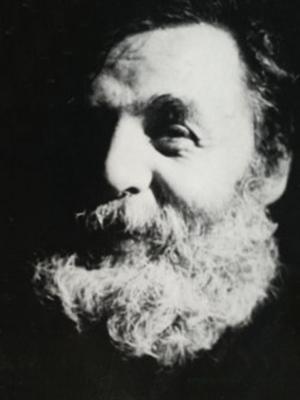
(* October 5, 1939 in Dresden; † May 2, 2017 in Zurich),
actually Ralf Winkler (pseudonyms were Tancred Mitschel, Mike Hammer, T.M., Mickey Spilane, Theodor Marx, a.Y. or Y), was a German painter, graphic artist, sculptor and jazz musician.
The important contemporary artist is considered the father of Germany's "Neue Wilde". Through his examination of ethnological and archaeological works, he created a universal, abstract-figurative system of signs in his paintings, prints and sculptures, with which he wanted to illustrate fundamental human relationships and dependencies.
Penck was self-taught. In 1953/54 he took lessons with the painter Jürgen Böttcher, then began an apprenticeship as a draughtsman at DEWAG in 1955/56 and attended evening classes at the Dresden Art Academy in 1956/57. Initially, he studied works by Rembrandt and Picasso.
In the 1960s, he then turned his attention to lyrical works, cybernetic studies, signals and symbols and developed his "Standard" system. During this time, he took part in unofficial exhibitions in the GDR. In 1968, he also held his first solo show at the Galerie Michael Werner in Cologne. Since then he has used the pseudonym A.R. Penck (after the ice age researcher Albrecht Penck). From 1971 to 1976 he was a member of the "Lücke" group. Despite conflicts with the state security, he took part in the Kassel documenta in 1972 (also in 1977, 1982, 1992). In 1976, he met Immendorff, with whom he campaigned against the division of Germany. He finally left for West Germany in 1980. He first moved to Kerpen near Cologne, relocated to London in 1983 and then settled in Dublin in 1987. In 1984, he took part in the Venice Biennale. From 1988 to 2005, he was a professor at the Düsseldorf Art Academy. Penck received the Goethe Foundation's Rembrandt Prize in 1980 and the Aachen Art Prize in 1985. His most recent solo exhibitions included the Museum Ludwig, Cologne, in 2010 and the famous foundation of the American collector Andrew Hall in 2012.
In his search for a universal visual language, A.R. Penck explored information theories, cybernetic studies, signals and symbols in the 1960s. From the insights he gained, he developed his "StandART" system of pictogram-like signs and figures, which became his trademark. With this directly tangible sign language, reminiscent of primitive rock drawings or hieroglyphics, he ironically but always seriously illustrates his visual analysis of existing conditions of interpersonal coexistence and coexistence.
AR Penck is represented in the following museums and institutions, among others:
- Albertinum, Dresden
- Museum Folkwang, Essen
- Museum Ludwig, Cologne
- Center Georges Pompidou, Paris
- Stedelijk Museum Amsterdam
- Basel Art Museum
- Museu d'Art Contemporani de Barcelona
- Tate Britain, London
- Museum of Modern Art, New York
- Toyota Municipal Museum of Art, Toyota Aichi
